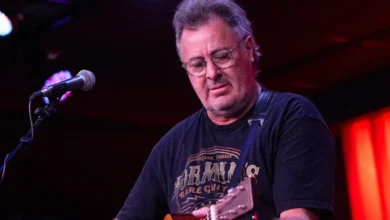Exhausted Yet Determined, He Performed Iconic Tunes Once More
Johnny Cash, known as “The Man in Black,” is a figure that resonates deeply with fans of country music and American folk. With a career spanning nearly five decades, he carved out a place in music history not only for his distinctive deep baritone voice and engaging storytelling but also for his authenticity and the profound emotional weight behind his lyrics. Born on February 26, 1932, in Kingsland, Arkansas, Cash’s early life was marked by hardship. Growing up during the Great Depression, he was influenced by the poverty around him and the rich legacy of music in his family. His mother’s singing and the local gospel church profoundly inspired him from a young age.
Cash’s journey into music began in earnest when he enlisted in the United States Air Force. It was there that he began to hone his skills as a songwriter and performer. After his service, he moved to Memphis, Tennessee, where he started to perform on radio and record music. His early works were a blend of country, rockabilly, and blues, which helped him gain popularity. The Sun Records label, where he recorded his first hit “Cry! Cry! Cry!” in 1955, played a pivotal role in launching his career. His unique sound melded with his rebellious image earned Cash a dedicated fan base.
Throughout the 1960s and into the 1970s, Cash’s music became richer and more varied, exploring themes of sorrow, redemption, and the struggles of the marginalized. His albums, particularly “At Folsom Prison” and “At San Quentin,” marked a significant turn in his career as he empowered prisoners through his music, reflecting a deep empathy for the disenfranchised. Songs like “Folsom Prison Blues” became anthems of resilience and hope, transcending the boundaries of traditional country music.
The relationship between Johnny Cash and June Carter Cash is another significant aspect of his legacy. Their partnership, both musically and romantically, became an iconic symbol of love and creative synergy. June, born into the famous Carter family, was a talented performer in her own right. The duo’s collaboration produced hits that became timeless classics. Their dynamic could be vividly felt in performances of songs such as “Jackson” and “It Ain’t Me Babe,” which highlighted their vocal chemistry, comedic banter, and affectionate connection.
As they navigated their rise to fame, the couple faced personal challenges, including the struggles with addiction and the darker aspects of celebrity life. Cash’s battle with substance abuse was well-documented and at times threatened to overshadow his musical accomplishments. However, with June’s steadfast support and love, he found his way back, remarking on her crucial role in his recovery and personal growth. Their love story is often viewed as a beacon of hope, illustrating how love can triumph over adversity.
In the later years of his life, Johnny Cash continued to innovate musically, collaborating with producer Rick Rubin. Under Rubin’s guidance, he recorded a series of critically acclaimed albums that introduced his music to a new generation while resonating deeply with longtime fans. Cash’s reinterpretations of classics and original songs exhibited a vulnerability and depth that belied his frailty. Tracks from his later albums, such as the haunting cover of “Hurt,” revealed introspection and a profound grappling with themes of mortality and legacy.
As he faced declining health due to Shy-Drager syndrome and the subsequent heartbreak from losing June in May 2003, his passion for music remained unwavering. This dedication was starkly evident during his final performance at the Carter Family Fold. The venue, rich with history and close to his heart, served as the perfect backdrop for a man who had dedicated his life to music. On that fateful day, despite battling laryngitis, he performed as if the weight of the world rested upon his shoulders, delivering each note with heartfelt sincerity.
Those who were present for that last concert recall the palpable emotion that filled the air. Cash’s son, John Carter Cash, played a role in that performance, offering support and sharing the stage with his father. Their family bond was evident, showcasing the legacy of music that runs deep in the Cash family. As he faced his health challenges, the young Cash was a reminder that Johnny’s influence would live on through the next generation.
Following his death in September 2003, just months after June, Cash was honored and mourned across the world. His music, imbued with a raw honesty and authenticity, continues to inspire contemporary artists and resonates with listeners of all ages. His exploration of profound themes such as love, loss, redemption, and faith provided a soundtrack to the struggles of everyday life, making his work timeless.
The legacy of Johnny Cash lives on not just through his extensive catalog of music but also through the impact he made on the industry and the hearts of his fans. His willingness to confront difficult subjects, articulate the plight of the downtrodden, and express vulnerability has cemented his status as one of the most significant figures in American music history. The resonating words, “Hello, I’m Johnny Cash,” will forever echo in the hearts of those who found solace, companionship, and inspiration in his indomitable spirit.





